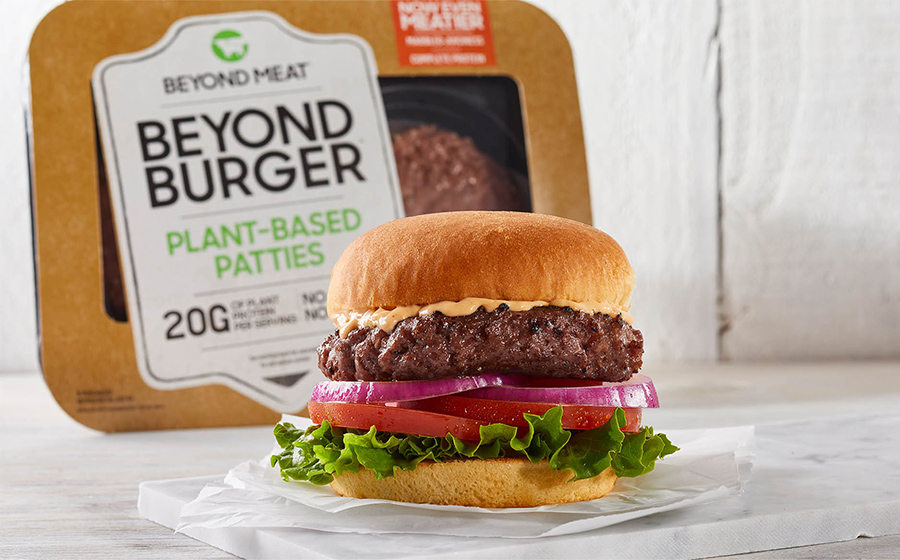Why have investors gone nuts for Beyond Meat, the maker of a vegetable-based meat alternative?
And \”nuts\” is an apt term. Beyond had its IPO in May at $25 per share that raised $240 million for Beyond and gave it a market valuation of $1.5 billion. That\’s good enough for a new company, but it\’s not the end of the story.
Shortly thereafter, the stock price blew the roof off by increasing rapidly to as much as $234 by the end of July. That\’s really good for a company that has never turned a profit and has limited availability of its product. Consumers can get it at some Whole Foods and Kroger stores and at a few test sites of several restaurant chains. That\’s about it.
But then something changed. At the end of July, Beyond reported its second-quarter numbers, which showed robustly increased sales but increasing losses too. That apparently reminded investors about Beyond\’s profitability challenge and explains why there was already a host of Beyond doubters in the form of short sellers.
Add to that Beyond\’s announcement that there would be a secondary stock offering, and something of a perfect storm took shape, causing its stock valuation to take quite a beating. Beyond says it intends to use proceeds from the new float to beef up production capacity, to meet future demand and to cover marketing costs.
The new float will be offered at $160 per share, or more than six times the IPO share price of $25. Many early investors are expected to cash out of their earlier positions, possibly to exercise options for the new float. Nevertheless, Beyond still has an impressive stock price, despite recent volatility. We\’ll see if the stock value stabilizes after the financial machinations subside. [See BYND].
High Finance
Axios Markets has a theory about the outsized valuation put on Beyond, which seems plausible to me. It posits that investors sense a big changes coming in food production and marketing. They know that consumers are turning away from conventional and highly processed product of all types in favor of more natural offerings such as organics, less gluten, less sugar and salt and, of course, less meat.
What they don\’t see are the many ways to invest in what\’s going on, despite the fact that there are many startups now tinkering with new food products intended to exploit the trends. But instead of immediately turning to the equity markets to raise capital, they are getting it from private investment funds. That allows them to grow and perhaps generate substantive revenue. Then, they can turn to the equity markets and gain big rewards. Impossible Foods, another major vendor of vegetable-based meat-like products, is now doing just that.
So, that means there are few new-food investment vehicles, which tends to prop up the valuation of any publicly traded company of the sort.
How Good Is It?
Now, let\’s let investors brood about all that while we take a closer look at the meatless trend to see if it\’s one that really has legs. Everyone will have a different opinion about how good the meatless product is. Mine is that I\’ve tried the offerings from both Beyond and Impossible and have found them to be pretty good, but short of being excellent.
The Impossible product is available at some units of several restaurant chains, marketed as the Impossible Burger. It\’s priced noticeably above the cost of a comparable beef burger. I tried it and found it to be good, but lacking in physical integrity – the whole thing just fell apart in my hands .
I\’ve also sampled the Beyond product in its various forms, which I obtained at Whole Foods. It also seems quite good, and quite a bit more costly than meat. It also has a bizarre \”bleeding\” feature (beet-juice extract), which I could do without. Impossible has the same feature.
That brings us to one of the biggest challenges facing meatless product – marketing and nomenclature. What could meatless be better called to make it really marketable? Now, it\’s variously referred to as plant meat, veggie meat and, inevitably, fake meat. It\’s styled as being similar to hamburgers, hot dogs, sausage and so on.
The thing is that no product has really succeeded by being positioned as a poor relative of the real thing, particularly when the alternative is priced well above the traditional thing. Breakfast cereal isn\’t marketed as a substitute for scrambled eggs. It\’s just cereal.
Call it \”Plantfood\”
So, how about calling meatless what it is – \”plantfood?\” After all, we have \”seafood\” to describe an array of ocean-based food. Maybe it\’s as simple as that.
Call it plantfood or not, but the imperative to settle on a new name for meatless may be accelerated by initiatives in several states to prohibit direct comparisons between meat alternatives and meat itself.
The latest is Arkansas, which has a newly enacted law prohibiting the use of the terms \”burger,\” \”hot dogs\” and \”sausage\” in package labeling unless they\’re really made of meat. Of course, the law has drawn legal challenges. Curiously, the names the law seeks to forbid are themselves suspect: Where\’s the ham in hamburger, where are the dogs in hot dogs and where is the sauce in sausage? It seems to me the Arkansas law is destined to fail.
The Arkansas law also outlaws the use of the term \”rice\” to describe cauliflower rice and the like. Many food processors have shifted to the term \”riced,\” which seems unassailable. The FDA is also looking into the use of \”milk\” with reference to products such as almond, soy and oat \”milk.\” Many processors are already using a run-on word, such as \”almondmilk\” or just almond beverage.
As might be expected, some businesses are betting against the meatless trend. One is Arby\’s. That restaurant chain is doubling down on its heritage by offering a wide variety of traditional meats at its restaurants, eschewing the meatless trend entirely.
That may turn out to be a viable trend too. Not everyone is tired of meat, or scared of it, just as there are still big consumer constituencies for heritage products and for long-standing retailers of all types.





